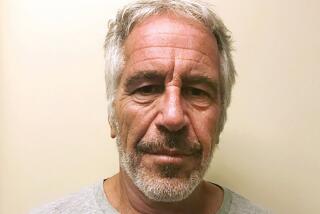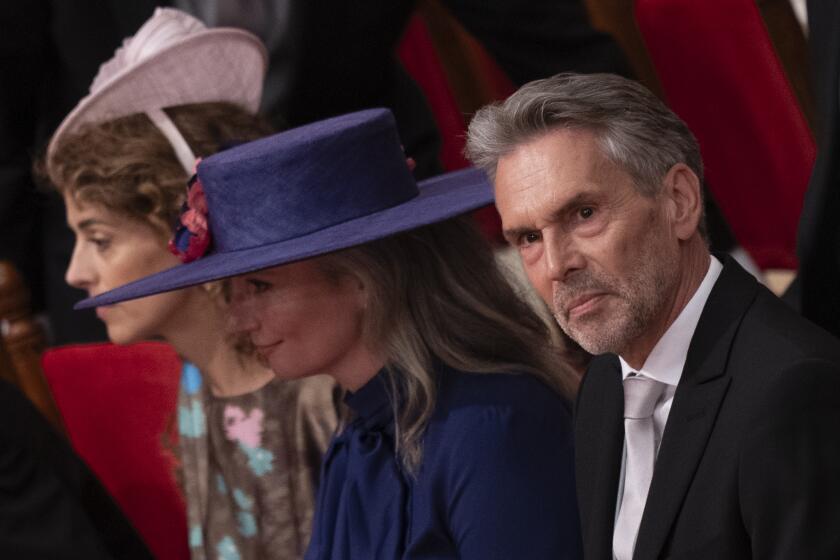Explanation for Death Penalty Sought in Fatal Smuggling Case
The roots of an immigrant smuggling operation that left 19 dead last year stretched through Texas, across the Mexican border and deep into Central America. Amid those associated with the incident -- convicted smugglers, suspects, victims and survivors -- one man has stood out.
Tyrone Williams was a working-class truck driver from Schenectady, N.Y., who typically spent his days hauling milk south and watermelons north. In May 2003, however, he allegedly was promised $5,000 to carry a truckload of undocumented immigrants to Houston. Fourteen suspects were indicted in connection with the operation, but Atty. Gen. John Ashcroft announced that the government would seek the death penalty against just one -- Williams.
Now, a judge wants prosecutors to explain that decision.
Williams, 33, has pleaded not guilty to charges of transporting and harboring illegal immigrants and conspiracy to transport immigrants. He is scheduled to go to trial Jan. 5, charged in connection with the incident in which more than 70 people were brought to “safe houses” in West Texas and then crammed into the back of a locked and unventilated tractor-trailer.
U.S. District Judge Vanessa D. Gilmore recently asked Assistant U.S. Atty. Tony R. Roberts for a letter, to be written by Ashcroft, explaining why they “sought the death penalty on this guy, the only black guy, and not on the others.” Gilmore’s request came after Williams’ attorneys argued that he had been targeted because of his race. Gilmore threatened to hold prosecutors in contempt if she did not receive the letter.
Roberts and Michael T. Shelby, the U.S. attorney for the southern district of Texas, are bound by a gag order not to discuss the case. Justice Department officials did not return phone calls.
In documents filed with the court, prosecutors said that they would not be able to produce the letter. The judge’s demand, they wrote, raises “serious separation of powers concerns.” The U.S. attorney’s office, they said, has “discretion on how to proceed in matters of prosecuting the laws in federal courts.” Ashcroft, they wrote, is busy, and his ability to do his job would be “severely hampered by requiring him to personally respond.”
Prosecutors also argued that Williams’ case was unique because he “was the only person in control of the tractor-trailer when the aliens’ situation deteriorated.”
“None of the other co-defendants had the power to release the aliens and possibly save their lives,” they wrote.
Prosecutors allege that when Williams pulled into a truck stop near Victoria, Texas, and opened the trailer doors, he panicked and fled. Authorities found 17 people, including a 5-year-old boy, dead in the truck or on the ground nearby. Two others died at area hospitals. As temperatures inside reached 173 degrees, authorities said, people scratched through the truck’s walls in an attempt to breathe.
In court documents, Williams’ attorney Craig A. Washington argued that 12 other suspects were eligible for the death penalty and that Williams had fallen victim to “selective prosecution.”
Included in the filing was a summary of research done by Kevin McNally, a Kentucky attorney who works with the Federal Death Penalty Resource Council, a group that monitors capital cases. McNally concluded that the Justice Department -- in the cases of 68 previous defendants charged with smuggling that resulted in death -- had never sought the death penalty. Of those 68, McNally said, 61 were Latino, three were white, two were black and two were of unknown ethnicity.
“Every other similarly situated individual in the history of the death penalty as it related to alien smuggling has been treated differently,” Washington wrote. He did not return phone calls seeking further comment.
Federal prosecutors have pointed out that they did not seek the death penalty against the other black defendant in the Texas case, Fatima Holloway, who was riding in the cab with Williams. But Williams’ attorneys call that argument disingenuous, since by all accounts Holloway was unaware of the horror unfolding in the trailer behind her. According to an affidavit filed by a federal investigator, Williams had met Holloway at another truck stop and had given her a ride.
The same affidavit suggests that Williams also was unaware of the scope of the operation. It says that he remained in the cab while the immigrants were loaded in. Williams had been told that there were 16 people, not 74 or more, inside. And when Williams pulled over and saw what was happening, he gave the immigrants 20 bottles of water before fleeing, the affidavit says.
In the first trial stemming from the smuggling ring, two men were found guilty Thursday of conspiracy and aiding in the transport of immigrants leading to their deaths. Both could face life in prison.
Williams’ attorneys have sought to compare his role to that of Karla Patricia Chavez Joya, a Honduran and the admitted ringleader of the operation. U.S. residents paid her at least $1,500 apiece to bring relatives across the border. She pleaded guilty in June and faces a maximum sentence of life in prison without possibility of parole, though she could receive a lighter sentence because she has agreed to cooperate with the government.
More to Read
Sign up for Essential California
The most important California stories and recommendations in your inbox every morning.
You may occasionally receive promotional content from the Los Angeles Times.











